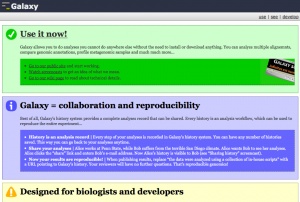Galaxy
You can help EcoliWiki by editing the content of this page. For information about becoming a registered user and obtaining editing privileges, see Help:Accounts.
<protect>
| Link/URL: | |
|---|---|
| What: |
Open source workflow management system |
| Who: |
|
| edit table |
</protect>
Contents
Short Description
Share your knowledge and ideas. How you can help. See Help pages if you need help with using the wiki
Galaxy is an open source workflow management system that can be used to access and analyze genomic data sets without any prior knowledge of programming.[1][2]
Galaxy allows users to operate on tabular data, using a variety of preinstalled tools.
Links
The Galaxy project and public instance are located at Penn State University.
Requirements
Galaxy is a web application. For most users, all you need is a browser.
If you want to set up your own Galaxy instance, it is supported on Linux and Mac OS/X. Windows is not currently supported. Python is required. See Get Galaxy at the Galaxy Wiki.
User notes
Getting started with Galaxy
These notes are for the main Galaxy instance, and are written from an E. coli-centric point of view.
Preloaded data for E. coli is in a counterintuitive location. Use Get Data->UCSC Archaea Table Browser. Select gamma proteobacteria
The first thing you will usually want to do is get some data set into your Galaxy workflow. Select Get Data from the tool menu. Galaxy gives you a variety of choices. You can upload your own file or load preloaded data. Galaxy's upload system can recognize Axt, Fasta, Fastqsolexa, Gff, Gff3, Html, Lav, Maf, Tabular, Wiggle, Bed and Interval (Bed with headers) formats. As of October 2010, Galaxy has preloaded data for several E. coli genomes. However, it may be better to upload gff3 files so you can use the latest RefSeq record.
Once you have tab-delimited data in Galaxy, you can perform calculations, sorting, filtering and so on. For example...
See Also
References
See Help:References for how to manage references in EcoliWiki.
- ↑ Taylor, J et al. (2007) Using galaxy to perform large-scale interactive data analyses. Curr Protoc Bioinformatics Chapter 10 Unit 10.5 PubMed
- ↑ Blankenberg, D et al. (2007) A framework for collaborative analysis of ENCODE data: making large-scale analyses biologist-friendly. Genome Res. 17 960-4 PubMed

